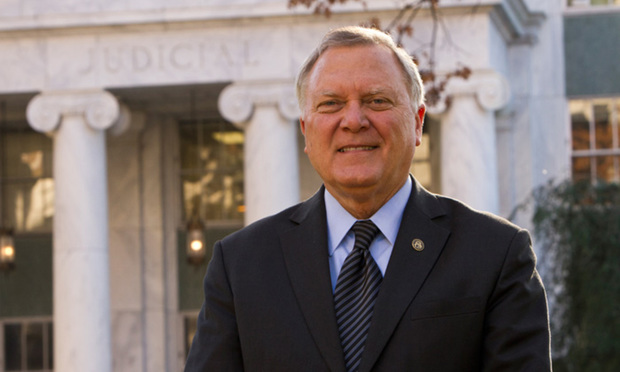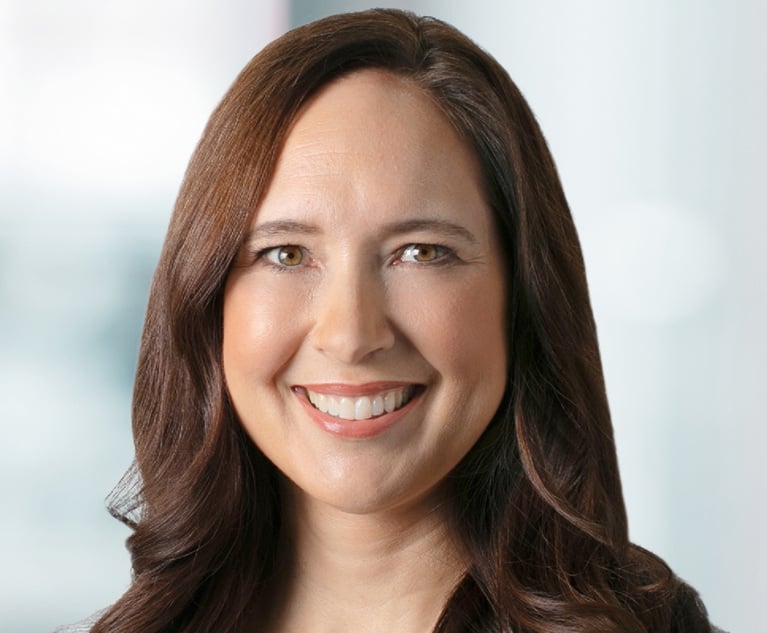Governor Diluted Diversity for Blacks at Appeals Courts; Women Saw Mixed Results
Deal expanded the Supreme Court and Court of Appeals by a total of five jurists in a series of moves that reduced the representation of blacks on those courts and women at the high court. But the proportion of women rose at the Court of Appeals.
September 24, 2018 at 05:52 PM
9 minute read
 Gov. Nathan Deal (Photo: John Disney / ALM)
Gov. Nathan Deal (Photo: John Disney / ALM)
Twenty times since becoming Georgia's governor in 2011, Nathan Deal has had an opportunity to choose members of the state Supreme Court and Court of Appeals.
Eighteen times he chose a white person. Fourteen times he chose a man.
Primarily because of these decisions, African-Americans on Georgia's top two courts—and women on the state Supreme Court—will have less influence when Deal leaves office than when he arrived nearly eight years ago.
At the Court of Appeals, however, Deal's appointments have increased the power of female judges.
Wayne Kendall, a Fayetteville lawyer who tracks judicial diversity in Georgia and advocates for more minority representation on the courts, said Deal was continuing a pattern of “ethnically cleansing the judiciary in Georgia with respect to African-American judges.”
“The trend has been so discouraging that many qualified African-American lawyers will no longer even apply,” Kendall said.
 Laurie Webb Daniel.
Laurie Webb Daniel.Laurie Webb Daniel, who heads the appellate practice at Holland & Knight, said she had no reason to criticize any of Deal's specific appointments to the appeals courts, but she added that women and minorities “have not made the progress we should have.”
A spokesman said Deal and administration officials had nothing to say about diversity on the top courts or his recent appointments to them, when the governor eschewed a majority female short list before choosing two white men.
Criticism of Deal's record on diversity in the judiciary contrasts with widespread credit he has received for leading the creation of more than 140 “accountability” courts around the state, which help mostly nonviolent criminals recover from addiction and other problems without further clogging jails and prisons.
State House Speaker David Ralston recently called for the new $110 million state judicial building to be named for Deal, who was a lawyer and judge before he entered Republican politics. The structure will house the two top courts, which Deal expanded by a total of five jurists in a series of moves that diluted the representation of blacks on those courts and women at the high court.
By the Numbers
When Deal took office, the Supreme Court had two black members among seven justices, for a 29 percent proportion. Now with nine members, the court still has only two black jurists, for a 22 percent share.
From 1992 until 2009, the seven-member high court had two women (29 percent), until Chief Justice Leah Ward Sears retired, and Gov. Sonny Perdue replaced her with now-Presiding Justice David Nahmias. So the Supreme Court had only one woman (14 percent) in Chief Justice Carol Hunstein when Deal took office.
When Deal convinced lawmakers to expand the Georgia Supreme Court to nine members, he added Justice Britt Grant, which increased female power to 22 percent. Grant left this summer to join Atlanta's federal appeals court, and Deal replaced her with Sarah Warren, keeping the 22 percent proportion intact. But, when Hunstein retires at the end of the year, she will be replaced by Appeals Court Judge John Ellington, who ran unopposed in a May election for Hunstein's seat.
At the Court of Appeals, the number of African-American members also has stayed at two while the court grew by three judges to 15. That dropped the proportion of black judges from 18 to 13 percent. Deal also tapped one Asian-American judge, so the overall minority influence at the appeals court grew from 18 percent to 20 percent.
At the appeals court, Deal's appointments doubled the number of women from three to six, pushing the proportion from 27 percent to 40 percent.
That figure surpasses the 38 percent of State Bar of Georgia members who are women, though the number of women is presumably around 50 percent in the overall state population. The bar doesn't keep racial statistics, but the 2010 census reported that 30.5 percent of Georgians were black.
“It's important to have statewide institutions … reflect the diversity of the people of the state of Georgia,” said Charles Johnson of Holland & Knight, who has long pushed for more minority representation on the courts.
 Rita Treadwell.
Rita Treadwell.“It's not enough,” Rita Treadwell, president of the Georgia Association of Black Women Lawyers, said of the numbers. “Why are we seeing a backward trend?”
Summer Surprise
Diversity advocates had reason to hope in March, when Randy Evans, who co-chaired Deal's Judicial Nominating Commission, urged women and minorities to apply for a spate of open appeals court judgeships.
Evans even countered a comment Deal had made in a 2016 interview with the Daily Report: “Is racial diversity more important than excellence and credentials and ability? It's a factor, but is it the most important factor? I don't think so.”
 Ambassador Randy
Ambassador RandyEvans.
Evans said in March that focusing on diversity “isn't a compromise on quality.”
This content has been archived. It is available through our partners, LexisNexis® and Bloomberg Law.
To view this content, please continue to their sites.
Not a Lexis Subscriber?
Subscribe Now
Not a Bloomberg Law Subscriber?
Subscribe Now
NOT FOR REPRINT
© 2025 ALM Global, LLC, All Rights Reserved. Request academic re-use from www.copyright.com. All other uses, submit a request to [email protected]. For more information visit Asset & Logo Licensing.
You Might Like
View All
A Plan Is Brewing to Limit Big-Dollar Suits in Georgia—and Lawyers Have Mixed Feelings
10 minute read
On The Move: Kilpatrick Adds West Coast IP Pro, Partners In Six Cities Join Nelson Mullins, Freeman Mathis
6 minute read

Did Ahmaud Arbery's Killers Get Help From Glynn County DA? Jury Hears Clashing Accounts
Trending Stories
- 1Law Firms Expand Scope of Immigration Expertise, Amid Blitz of Trump Orders
- 2Latest Boutique Combination in Florida Continues Am Law 200 Merger Activity
- 3Sarno da Costa D’Aniello Maceri LLC Announces Addition of New Office in Eatontown, NJ, and Named Partner
- 4Friday Newspaper
- 5Public Notices/Calendars
Who Got The Work
J. Brugh Lower of Gibbons has entered an appearance for industrial equipment supplier Devco Corporation in a pending trademark infringement lawsuit. The suit, accusing the defendant of selling knock-off Graco products, was filed Dec. 18 in New Jersey District Court by Rivkin Radler on behalf of Graco Inc. and Graco Minnesota. The case, assigned to U.S. District Judge Zahid N. Quraishi, is 3:24-cv-11294, Graco Inc. et al v. Devco Corporation.
Who Got The Work
Rebecca Maller-Stein and Kent A. Yalowitz of Arnold & Porter Kaye Scholer have entered their appearances for Hanaco Venture Capital and its executives, Lior Prosor and David Frankel, in a pending securities lawsuit. The action, filed on Dec. 24 in New York Southern District Court by Zell, Aron & Co. on behalf of Goldeneye Advisors, accuses the defendants of negligently and fraudulently managing the plaintiff's $1 million investment. The case, assigned to U.S. District Judge Vernon S. Broderick, is 1:24-cv-09918, Goldeneye Advisors, LLC v. Hanaco Venture Capital, Ltd. et al.
Who Got The Work
Attorneys from A&O Shearman has stepped in as defense counsel for Toronto-Dominion Bank and other defendants in a pending securities class action. The suit, filed Dec. 11 in New York Southern District Court by Bleichmar Fonti & Auld, accuses the defendants of concealing the bank's 'pervasive' deficiencies in regards to its compliance with the Bank Secrecy Act and the quality of its anti-money laundering controls. The case, assigned to U.S. District Judge Arun Subramanian, is 1:24-cv-09445, Gonzalez v. The Toronto-Dominion Bank et al.
Who Got The Work
Crown Castle International, a Pennsylvania company providing shared communications infrastructure, has turned to Luke D. Wolf of Gordon Rees Scully Mansukhani to fend off a pending breach-of-contract lawsuit. The court action, filed Nov. 25 in Michigan Eastern District Court by Hooper Hathaway PC on behalf of The Town Residences LLC, accuses Crown Castle of failing to transfer approximately $30,000 in utility payments from T-Mobile in breach of a roof-top lease and assignment agreement. The case, assigned to U.S. District Judge Susan K. Declercq, is 2:24-cv-13131, The Town Residences LLC v. T-Mobile US, Inc. et al.
Who Got The Work
Wilfred P. Coronato and Daniel M. Schwartz of McCarter & English have stepped in as defense counsel to Electrolux Home Products Inc. in a pending product liability lawsuit. The court action, filed Nov. 26 in New York Eastern District Court by Poulos Lopiccolo PC and Nagel Rice LLP on behalf of David Stern, alleges that the defendant's refrigerators’ drawers and shelving repeatedly break and fall apart within months after purchase. The case, assigned to U.S. District Judge Joan M. Azrack, is 2:24-cv-08204, Stern v. Electrolux Home Products, Inc.
Featured Firms
Law Offices of Gary Martin Hays & Associates, P.C.
(470) 294-1674
Law Offices of Mark E. Salomone
(857) 444-6468
Smith & Hassler
(713) 739-1250






